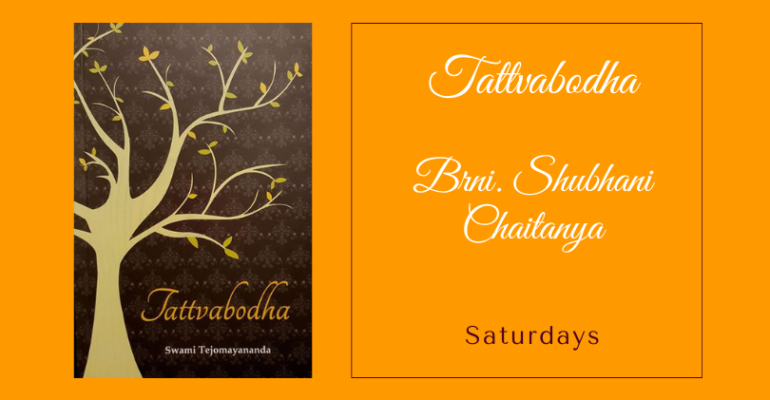Podcast on Spotify
I. Inquiry into the statement That Thou Art
ननु साहंकारस्य किंचिज्ज्ञस्य जीवस्य निरहंकारस्य सर्वज्ञस्य
ईश्वरस्य तत्त्वमसीति महावाक्यात् कथमभेदबुद्धिः स्यादुभयोः
विरुद्धधर्माक्रान्तत्वात् ।
इति चेन्न । स्थूलसूक्ष्मशरीराभिमानी त्वंपदवाच्यार्थः ।
उपाधिविनिर्मुक्तं समाधिदशासम्पन्नं शुद्धं चैतन्यं
त्वंपदलक्ष्यार्थः ।
एवं सर्वज्ञत्वादिविशिष्ट ईश्वरः तत्पदवाच्यार्थः ।
उपाधिशून्यं शुद्धचैतन्यं तत्पदलक्ष्यार्थः ।
एवं च जीवेश्वरयो चैतन्यरूपेणाऽभेदे बाधकाभावः ।
nanu sāhaṃkārasya kiṃcijjñasya jīvasya nirahaṃkārasya sarvajñasya
īśvarasya tattvamasīti mahāvākyāt kathamabhedabuddhiḥ syādubhayoḥ viruddhadharmākrāntatvāt .
iti cenna . sthūlasūkṣmaśarīrābhimānī tvaṃpadavācyārthaḥ .
upādhivinirmuktaṃ samādhidaśāsampannaṃ śuddhaṃ caitanyaṃ tvaṃpadalakṣyārthaḥ .
evaṃ sarvajñatvādiviśiṣṭa īśvaraḥ tatpadavācyārthaḥ .
upādhiśūnyaṃ śuddhacaitanyaṃ tatpadalakṣyārthaḥ .
evaṃ ca jīveśvarayo caitanyarūpeṇā’bhede bādhakābhāvaḥ .
Question
But the jīva is endowed with ego and his knowledge is limited, whereas Īśvara is without ego and is omniscient. Then how can there be identity, as stated in the mahāvākya, “That thou art”, between these two who are possessed of contradictory characteristics?
Answer
If there is such a doubt, no, it is not so. That literal meaning of the word ‘thou’ is the one identified with the gross and subtle bodies. The implied meaning of the word ‘thou’ is pure awareness which is free from all conditionings and which is appreciated in the state of samādhi. So also the literal meaning of the word ‘That is Īśvara having omniscience etc.; the implied meaning of the word that is the pure awareness, free from all conditionings. Thus there is no contradiction regarding the identity between the jīva and Īśvara from the standpoint of awareness.
Explanation
- The translation of this statement is “You (the Jīva) Are That (Īśvara)”, and therefore it raises a doubt – how can the jīva and Īśvara be equal to each other, given that they both have opposing natures?
- This is only the literal meaning of the statement. The implied meaning of this statement should be taken. E.g. He is a lion does not mean so literally, it means he is strong.
- The direct meaning of “Thou” is the individual identified with its conditionings. But if we take the implied meaning, which is the individual dis-identified with its conditionings, it refers to the Ātman, the pure awareness.
- The direct meaning of “That” is the Īśvara associated with māyā. But if we take the implied meaning, which is the Īśvara dis-identified with its associations, it refers to pure awareness as well.
- Therefore the essence of the jīva and Īśvara is the same, when the implied meaning is taken, hence there is no contradiction in the statement.
II. The Jīvanmuktaḥ
एवं च वेदान्तवाक्यैः सद्गुरूपदेशेन च सर्वेष्वपि
भूतेषु येषां
ब्रह्मबुद्धिरुत्पन्ना ते जीवन्मुक्ताः इत्यर्थः ।
ननु जीवन्मुक्तः कः ?
यथा देहोऽहं पुरुषोऽहं ब्राह्मणोऽहं शूद्रोऽहमस्मीति
दृढनिश्चयस्तथा नाहं ब्राह्मणः न शूद्रः न पुरुषः
किन्तु असंगः सच्चिदानन्द स्वरूपः प्रकाशरूपः सर्वान्तर्यामी
चिदाकाशरूपोऽस्मीति दृढनिश्चय रूपोऽपरोक्षज्ञानवान् जीवन्मुक्तः ॥
ब्रह्मैवाहमस्मीत्यपरोक्षज्ञानेन निखिलकर्मबन्धविनिर्मुक्तः स्यात् ।
evaṃ ca vedāntavākyaiḥ sadgurūpadeśena ca sarveṣvapi bhūteṣu yeṣāṃ
brahmabuddhirutpannā te jīvanmuktāḥ ityarthaḥ .
nanu jīvanmuktaḥ kaḥ ?
yathā deho’haṃ puruṣo’haṃ brāhmaṇo’haṃ śūdro’hamasmīti
dṛḍhaniścayastathā nāhaṃ brāhmaṇaḥ na śūdraḥ na puruṣaḥ
kintu asaṃgaḥ saccidānanda svarūpaḥ prakāśarūpaḥ sarvāntaryāmī
cidākāśarūpo’smīti dṛḍhaniścaya rūpo’parokṣajñānavān jīvanmuktaḥ ..
brahmaivāhamasmītyaparokṣajñānena nikhilakarmabandhavinirmuktaḥ syāt .
Translation
Thus by the words of Vedānta and the teachings of the satguru, those in whom the vision of the truth is born in all beings, are liberated while living (jīvanmuktah).
Then who is a jīvanmuktah? Just as one has firm belief ‘I am the body’; ‘I am a man’, in the same way one who by his immediate knowledge has firmly ascertained, ‘I am not the body’ but ‘I am unattached’ and of the nature of Existence-Consciousness-Bliss, Effulgent, the Indweller of all and the Formless Awareness is a jīvanmuktah. By immediate knowledge that I am Brahman alone, one becomes free from bondage of all karmas.
Explanation
- This teaching of “Thou Art That” cannot be gained by mere reading, it has to come from a teacher who has the ability to communicate the teachings, and also embodies and lives this teaching.
- We usually cannot see any external changes in a person who lives this teaching. What we do see is the realization that pure awareness is in all beings. Such a person is liberated while living, a jīvanmuktah.
- They possess the eye of wisdom that views the inner being rather than our “fleshy” eyes that only focus on names and forms.
- Chapter five of the Gīta makes a similar point – one who has this eye of wisdom does not distinguish between names and forms, in various kinds of animals and in various kinds of people, and focuses only on their inner being. Many saints including Shri Ramana Maharshiji would treat animals with the same compassion and respect as they would treat people.
- The jīvanmuktah has the firm, deep-rooted understanding that “I am the pure awareness” which is a conviction and not a thought that can come and go, similar to the conviction of the actor that he or she is an actor, not the character, in a play.
- The jīvanmuktah is asangaḥ – unattached. Whatever happens at the level of the body and mind does not affect them since they are not identified with body and mind, similar to the screen which is unaffected by the storm in the movie it is showing. The more one identifies, the more they are affected.

